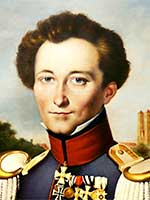
Carl von Clausewitz
Prussian general and military theorist
Lived from: 1780 - 1831
Category: Politics | Scientists Country: ![]() Germany
Germany
Born: 1 june 1780 Died: 16 november 1831
Search within the quotes from Carl von Clausewitz for these words:
Quotes 1 till 20 of 59.
-
A general who allows himself to be decisively defeated in an extended mountain position deserves to be court-martialled.
On War (1832) Ch. 17― Carl von Clausewitz -
A prince or general can best demonstrate his genius by managing a campaign exactly to suit his objectives and his resources, doing neither too much nor too little.
On War (1832)― Carl von Clausewitz -
Action in war is like movement in a resistant element. Just as the simplest and most natural of movements, walking, cannot easily be performed in water, so in war it is difficult for normal efforts to achieve even moderate results.
On War (1832) Ch. 7, as translated by Michael Howard and Peter P― Carl von Clausewitz -
All action takes place, so to speak, in a kind of twilight, which like a fog or moonlight, often tends to make things seem grotesque and larger than they really are.
On War (1832)― Carl von Clausewitz -
Although our intellect always longs for clarity and certainty, our nature often finds uncertainty fascinating.
On War (1832)― Carl von Clausewitz -
An intellectual instinct which extracts the essence from the phenomena of life, as a bee sucks honey from a flower. In addition to study and reflections, life itself serves as a source.
On War (1832)― Carl von Clausewitz -
Any complex activity, if it is to be carried on with any degree of virtuosity, calls for appropriate gifts of intellect and temperament. If they are outstanding and reveal themselves in exceptional achievements, their possessor is called a 'genius'.
On War (1832)― Carl von Clausewitz -
Any move made in a state of tension will be of more important, and will have more results, than it would have made in a state of eqilibrium. In times of maximum tension this importance will rise to an infinite degree.
On War (1832)― Carl von Clausewitz -
Architects and painters know precisely what they are about as long as they deal with material phenomena.... But when they come to the aesthetics of their work, when they aim at a particular effect on the mind or on the senses, the rules dissolve into nothing but vague ideas.
On War (1832)― Carl von Clausewitz -
As man under pressure tends to give in to physical and intellectual weakness, only great strength of will can lead to the objective.
On War (1832)― Carl von Clausewitz -
Beauty cannot be defined by abscissas and ordinates; neither are circles and ellipses created by their geometrical formulas.
On War (1832)― Carl von Clausewitz -
Boldness will be at a disadvantage only in an encounter with deliberate caution, which may be considered bold in its own right, and is certainly just as powerful and effective; but such cases are rare.
On War (1832)― Carl von Clausewitz -
Great things alone can make a great mind, and petty things will make a petty mind unless a man rejects them as completely alien.
On War (1832)― Carl von Clausewitz -
If defense is the stronger form of war, yet has a negative object, it follows that it should be used only so long as weakness compels, and be abandoned as soon as we are strong enough to pursue a positive object.
On War (1832)― Carl von Clausewitz -
If the leader is filled with high ambition and if he pursues his aims with audacity and strength of will, he will reach them in spite of all obstacles.
― Carl von Clausewitz -
In the whole range of human activities, war most closely resembles a game of cards.
On War (1832)― Carl von Clausewitz -
In war, the advantages and disadvantages of a single action could only be determined by the final balance.
On War (1832)― Carl von Clausewitz -
It is better to go on striking in the same direction than to move one's forces this way and that.
On War (1832)― Carl von Clausewitz -
It is even better to act quickly and err than to hesitate until the time of action is past.
On War (1832)― Carl von Clausewitz -
Knowledge in war is very simple, being concerned with so few subjects, and only with their final results at that. But this does not make its application easy.
On War (1832)― Carl von Clausewitz
All Carl von Clausewitz famous quotes and sayings you will always find on greatest-quotations.com









